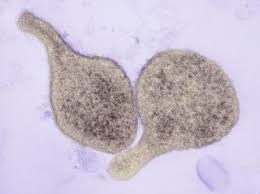Mycoplasma genitalium: a future STI superbug?
- lagacetainfecciosa
- 24 oct 2018
- 3 Min. de lectura
Actualizado: 26 oct 2018
Author: Shubo Saiful, final year student of BSc (Hons) Biomedical Science at De Montfort University (Leicester, United Kingdom
New evidence in the world of science is putting in the spotlight a sexually transmitted bacterium, Mycoplasma genitalium. M. genitalium has become a public health concern as infection numbers are rising, notably because the initiation of the infection is asymptomatic and because it is developing resistance to currently known antibiotics.

M. genitalium, abbreviated as MGen or MG, was firstly isolated in 1980. Antibiotics like penicillin or other beta-lactams cannot affect this pathogen as it lacks a cell wall. Transmission of M. genitalium can occur through direct contact of mucosa during unprotected sexual intercourse or oral sex. However, the risks of contracting the disease through a sexual encounter are slightly less than for Chlamydia trachomatis because of the low presence of M. genitalium in human genital organs.
Infection numbers due to M. genitalium are rising because it does not produce any symptoms at the beginning of the infection. Thus, infected patients usually develop symptoms 5 years after becoming in contact with M. genitalium. Symptoms in men are generally related to urethral infections and burning sensation when urinating. Whereas, women can develop bleeding between periods and abnormal abdominal pain caused by infection of the cervix (pelvic inflammatory disease). If left untreated, the inflammation may spread to the Fallopian tubes and cause infertility in females.
A research study conducted in the United Kingdom in people aged 16-22 years old have reported that 1 person out of 100 is carrying this pathogen with the majority of the people having no sign or evidence of carrying the disease (nhs.uk, 2018). The symptoms are similar to other STIs, such as chlamydia (Chlamydia trachomatis) or gonorrhoea (Neisseria gonorrhoeae). In fact, M. genitalium is sometimes found as co-infection with Human Immunodeficiency virus (HIV), gonorrhoea and chlamydia.
The media has described these bacteria as a “superbug” because it is developing resistance to the few antibiotics that were effective against this pathogen, specifically azithromycin. Thus, analysis of different strains of M. genitalium has shown to develop resistance to azithromycin through mutations found in region V of the 23S ribosomal RNA gene (Seth et al., 2018). M. genitalium is opposing drug-resistance by either acquiring through mutation or by picking up antibiotic-resistant genes from other microbes. Therefore, it is essential to use the right treatment and not overuse antibiotics because this process will enhance the pathogenic bacteria to become more drug-resistant.
What could I do to protect myself from this STI?
Prevention would be similar too for other sexually transmitted infections (STIs), i.e. practising safe sex. To avoid this pathogen from developing resistance to antibiotics, people that are in an antibiotic regime should practise safe sex and a follow-up test of urine should be performed in patients to establish if they have cleared the infection.
Future preparedness
Although M. genitalium is a common STI, it is not usually screened in sexual health services. New guidelines by the British Association of Sexual Health and HIV (BASHH) have recommended that people showing symptoms of pelvic inflammatory disease, bleeding after sex or any pain while urinating should be tested for MG infection (BASHH, 2018).
Moreover, the diagnosis is also important for pregnant women, as they may present a risk of spontaneous abortion or preterm birth when infected with this Mycoplasma. Despite insufficient information about the transmission of this bacteria during delivery, experts have recommended that neonates should also be observed for signs of infection.
Researchers have suggested that the prevalence of M. genitalium is underestimated, and the risk in a few years, if this pathogen is spreading and keeps developing resistance against conventional antibiotics, could be catastrophic.
Other references
Bashh.org. (2018). BASHH launches new NICE accredited guidelines to help prevent Mycoplas…. [online] Available at: https://www.bashh.org/news/news/bashh-launches-new-nice-accredited-guidelines-to-help-prevent-mycoplasma-genitalium-becoming-the-next-superbug-but-funding-cuts-may-hinder-implementation/ [Accessed 12 Oct. 2018].
BBC News. (2018). Sex 'superbug': 90-second guide. [online] Available at: https://www.bbc.co.uk/news/av/health-44894095/sex-superbug-90-second-guide [Accessed 11 Oct. 2018].
Crystal Wong (2018). Mycoplasma genitalium: Challenges in Diagnosis and Treatment. [online] Infectious Disease Advisor. Available at: https://www.infectiousdiseaseadvisor.com/sexually-transmitted-diseases/m-genitalium-challenges-in-diagnosis-and-treatment/article/682918/ [Accessed 16 Oct. 2018].
nhs.uk. (2018). New guidelines issued on a 'STI. [online] Available at: https://www.nhs.uk/news/medical-practice/new-guidelines-issued-sti-most-people-have-never-heard/ [Accessed 16 Oct. 2018].
Seth, S., Zambian, K. and Jain, N. (2018). Mycoplasma genitalium infections: current treatment options and resistance issues. [online] NCBI-PMC. Available at: https://www.ncbi.nlm.nih.gov/pmc/articles/PMC5589104/ [Accessed 12 Oct. 2018].

Comentarios